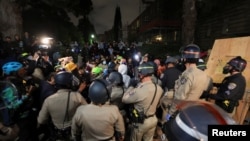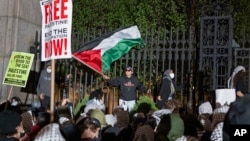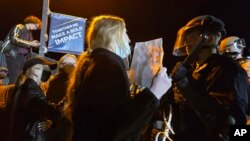Clashes erupted early Wednesday at a pro-Palestinian protest camp at the University of California, Los Angeles, while in New York City, police cleared a pro-Palestinian protest site at Columbia University where demonstrators had taken over a campus building.
At UCLA, counter-demonstrators supporting Israel repeatedly threw objects and tried to dismantle barricades erected by the pro-Palestinian group, which is seeking to have the university divest from Israel. University officials declared their protest unlawful and in violation of school policy.
The protesters and counter-protesters initially were kept apart from each other late Tuesday, but the situation turned more violent in the early morning hours as the counter-protesters shot fireworks, advanced on the camp barricade and repeatedly launched objects at the protesters.
There were small clashes between the two sides in front of the barricade, and while police deployed to the area at the request of university leaders, officers did not immediately separate the two sides. The scene was calm by daybreak.
In New York, police entered Columbia after the school said it requested help. A tent encampment on the school's grounds was cleared, along with Hamilton Hall, where a stream of officers used a ladder to climb through a second-floor window. Protesters had seized the building at the Ivy League school about 20 hours earlier.
"After the university learned overnight that Hamilton Hall had been occupied, vandalized, and blockaded, we were left with no choice," the school said. "The decision to reach out to (police) was in response to the actions of the protesters, not the cause they are championing. We have made it clear that the life of campus cannot be endlessly interrupted by protesters who violate the rules and the law."
A few dozen people were arrested at Columbia, the latest of hundreds who have been arrested at campuses across the country in the last two weeks during pro-Palestinian protests against Israel’s continued war against Hamas militants in Gaza.
At UCLA, the clashes took place around a tent encampment built by pro-Palestinian protesters, who erected a line of parade barricades, plywood and wooden pallets at the edge of the camp — while counter-protesters tried to pull them down. Video footage showed fireworks exploding over and in the encampment. People threw chairs and other objects and at one point a group piled on a person who lay on the ground.
Los Angeles Mayor Karen Bass, in a post on the X social media platform, called the violence at UCLA "absolutely abhorrent and inexcusable.”
At Northern Arizona University in Flagstaff, police in riot gear closed in on an encampment late Tuesday and arrested about 20 people for trespassing, at least one of whom was thrown to the ground. University officials had warned earlier in the day that students would face criminal charges if they did not disperse.
First-year student Brayden Lang watched from the sidelines. "I still know very little about this conflict," he said. "But the deaths of thousands (in Gaza) is something I cannot stand for."
Police also cleared an encampment at Tulane University in New Orleans early Wednesday.
The nationwide campus protests began at Columbia in response to Israel's counter-offensive in Gaza after Hamas launched a surprise attack on southern Israel on October 7. Militants killed about 1,200 people, most of them civilians, and took about 250 hostages. Vowing to erase Hamas control of Gaza, Israel has killed more than 34,000 Palestinians in the territory along the Mediterranean Sea, two-thirds of them women and children, according to the Gaza health ministry
At a meeting of the U.N. General Assembly on Wednesday about Palestinian statehood, Israel’s ambassador condemned the student protesters.
“We always knew that Hamas hides in schools – we just didn’t realize that it’s not just schools in Gaza, but it's also Harvard, Columbia and many ‘elite’ universities” in the U.S., Gilad Erdan said.
White House National Security Council spokesman John Kirby told reporters Tuesday that President Joe Biden believes students occupying an academic building is “absolutely the wrong approach,” and “not an example of peaceful protest.”
Democratic Congressman Jamaal Bowman, who represents a New York district near Columbia University, called on the school to stop what he called a “dangerous escalation.”
"Educational institutions should be spaces to nurture critical thinking skills and learn to work together with diverse communities to enact a more just and peaceful world,” Bowman said in a statement. “The militarization of college campuses, extensive police presence, and arrest of hundreds of students are in direct opposition to the role of education as a cornerstone of our democracy."
Facing calls to resign over how she has handled the protests, Columbia’s president, Minouche Shafik, released a statement Monday condemning calls for violence and reiterating the university's commitment to "academic freedom and to ensuring that all members of our community have the right to speak their minds."
Insisting Columbia will not divest from Israel, Shafik said the school has instead "offered to develop an expedited timeline for review of new proposals from the students by the ... body that considers divestment matters."
VOA United Nations correspondent Margaret Besheer contributed to this report. Some information came from Agence France-Presse, The Associated Press and Reuters.














